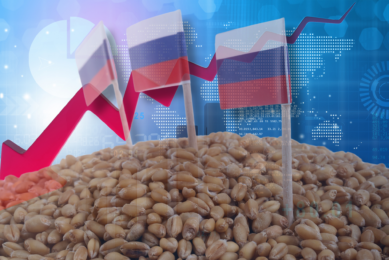Export issues ahead as Russia invades Ukraine

Wheat, maize and sunflower oil exports from Russia and Ukraine face disruption following Russia’s invasion last week.
The UK’s Agriculture Horticulture Development Board (AHDB) reported Russian media source Interfax as saying that commercial ship movements in the Sea of Azov had been suspended. Russia controls the Kerch Strait where the Sea of Azov joins the Black Sea. Both countries export from the Sea of Azov.
Export distruptions are likely
Ukraine has asked Turkey to prevent Russian ships leaving the Black Sea (Refinitiv) as Turkey controls the Bosphorus and Dardanelles straits. Russia was saying its ports in the Black Sea were working “as usual.”
AHDB said disruptions to exports from the region were likely and there were significant volumes of wheat, maize and sunflower oil left to ship this season. Quoting USDA figures, it said there were 5.5m tonnes of wheat, 13.7m tonnes of maize and 4m tonnes of sunflower oil that remained for Ukraine to ship in the 2021/2 season.
Stocks in other major exporters are already expected to fall to low levels by the end of this season, amplifying the global price impact.
Alternative export sources for wheat
For grains, disruption in exports from Russia and/or Ukraine is likely to push more demand to other major exporters. For wheat, this could be the EU-27 or the United States. The invasion led to nearby UK wheat futures closing last Thursday (24 Feb) at £243.75/tonne gaining £10/t across the day and £22.85/t during the week – the highest nearby price since at least 1987. This is set to cause further pain for the poultry sector which is already facing record feed prices, with UK egg producers dealing with feed costs up more than £1 per hen over the past year, according to Robert Gooch, chief executive of the British Free Range Producers Association (Bfrepa).
Sources for oil crops uncertain
Options for maize were less clear given the recent issues with South American crops. However, for sunflower oil, Russia and Ukraine were expected to account for roughly 78% of global exports this year. Disruption could mean a need to switch to other vegetables oils. In turn, this would lead to support for rapeseed oil as well as rapeseed prices.
Knock-on effect for fertiliser & fuel prices
The escalating situation could also have a knock-on effect on fertiliser and fuel prices. Fuel prices jumped last week to more than $100/barrel before falling back and could have a knock-on effect for food retailers and ultimately consumers. Natural gas prices also jumped last week to pre-Christmas levels, which could push up nitrogen fertiliser prices.
Matthew Kealey, head of crop inputs at AF Group, said the decision by the German chancellor not to commission the Nord Stream 2 pipeline had raised concerns within the industry but the impact was likely to be in the medium term as most its farmer members had secured their early season fertiliser requirements. However, he accepted that some grassland producers had yet to purchase.











